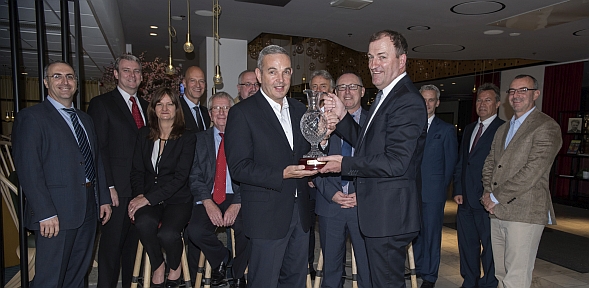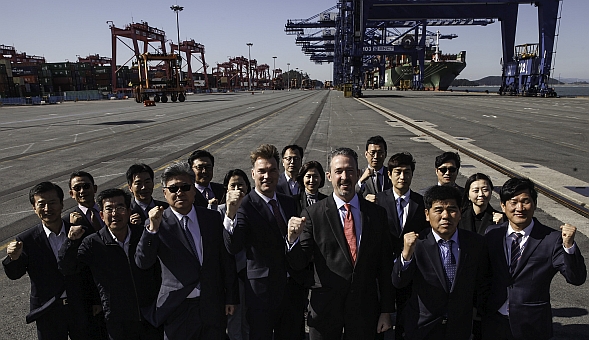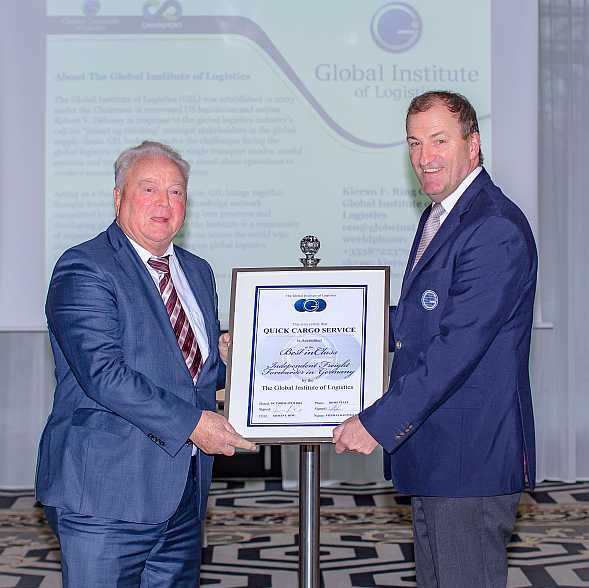2016
2016 WFA ACCREDITED BEST IN CLASS
STOCKHOLM JUNE 2016
WORLD FREIGHT ALLIANCE
BEST IN CLASS INDEPENDENT FREIGHT FORWARDING NETWORK
The World Freight Alliance has been named the benchmark Independent Freight Forwarding Network globally. The presentation of the Institute’s “Global Best in Class Independent Freight Forwarding Network”. Accreditation took place in Stockholm today.
The announcement comes as a result of the Institute’s preliminary findings from its research study “Independent Freight Forwarding in Global Logistics” The purpose of the research is to investigate the increasing trend by Beneficial Cargo Owners (BCO’s) to outsource the management of their global logistics requirements to independent freight forwarders (IFF)

click on image for caption and gallery
In 1996, 75% of all sea freight volumes were booked directly with carriers, today that number has dropped to 59% and is expected to go below 50% by 2020. Even more remarkable is that it is independent freight forwarders that will enjoy a greater market share of this growth than multinational 3PL’s at 30% This switch away from carriers to forwarders is being driven by two key factors, firstly the increasing complexity of global supply chains and secondly the increasingly commoditized nature of the carriers offering.
Preliminary findings from the research indicate that one of the key drivers prompting BCO’s to work with independents is their provision of personalized bespoke services combined with access to global independent freight forwarding networks. Such is the significance of network membership for BCO’s in choosing an independent, the Institute’s final report will include a comprehensive overview of how such networks operate. To date there has been very little in the way of research on how successful freight forwarding networks operate. As a result BCO’s and freight forwarders have access to very little information when evaluating the market place. The Institute will address this knowledge deficit in its final report.
The Institute’s approach is to first identify a benchmark network to research and for this the Institute has chosen the World Freight Alliance (WFA)
Commenting on today’s announcement, Kieran Ring CEO at the Institute said
“I am delighted to present the World Freight Alliance with the Institute’s accreditation ‘Global Best in Class Independent Freight Forwarding Network’ The Institute have been aware of the alliance since its foundation in 2003 and have been impressed with how the network has developed. WFA members demonstrate an exceptional level of commitment to network relationships. This has led over time to the development of interdependent activities, increasing the level of mutual productivity and resulting in excellent service for BCO’s.
Collaboration is the hallmark of Best in Class and the Institute is excited to be afforded the opportunity by the WFA to now go deeper in our research and provide readers with a unique insight into the development of an international network of regionally independent freight forwarders. Our final report will enable both BCO and freight forwarder to determine the hallmarks of an efficient global independent freight forwarding network. I look forward to working with the WFA.”
Commenting on today’s announcement, Tommy Kelly Chairman of the World Freight Alliance said:
“I would like to thank the Institute on behalf of the entire network for bestowing “Best in Class” status on the WFA. The vast majority of our current membership have worked together for upwards of 20 years and we remain committed to our founding principles.
Collectively our group represents some of the world’s best and longest established organizations in the business. Each and every member has a reputation for local knowledge and expertise capable of offering a full suite of services including freight forwarding, customs clearance, logistics and warehousing, fiscal representation and express delivery services.
We guarantee a standardized level of excellence in all regions. Our goal is always to partner with other experienced companies to provide a seamless service offering across the world.
The WFA looks forward to working with GIL in the next stage of the research process”
The research will explore:
- The development of the WFA
- How the WFA operates focusing on the relevance of relationship and network theory to the behavior of medium and large sized members in the network.
- The development of the WFA from the perspective of member firms.
- How WFA comprising competing forwarders operates and will focus on the relevance of relationship and network theory to the behavior of freight forwarders in business networks.
- How by leveraging the WFA platform, members have developed relationships with the aim of pooling their resources and activities to offer a freight forwarding service on behalf of other firms in the network.
- How members have by connecting with freight forwarders in other countries and combining their resources and activities with those firms offer a more expansive service with a global reach greater than each individual firm would be capable of offering alone.
NOTES TO EDITORS
ABOUT THE WORLD FREIGHT ALLIANCE
The World Freight Alliance (WFA) enjoy a very distinguished history in the development of global independent freight forwarding networks. While established in 2003, WFA’s roots go back to 1990 when Airborne Express the express delivery company and cargo airline, headquartered in Seattle, Washington developed the Overseas Express Carriers (OEC) alliance. The OEC, was an alliance of independent global express companies that functioned as a worldwide delivery network for its members to compete with larger companies.
In 2003, when Airborne was aquired by DHL to gain a foothold in the US market, the other members of the OEC alliance with 13 years hands on experience of dealing with each other formed the WFA.
The WFA is an industry network where freight forwarders have developed relationships with the aim of pooling their resources and activities to offer a freight forwarding service on behalf of other firms in the network. Thus, by connecting with freight forwarders in other countries and combining their resources and activities with those firms, the network of freight forwarders offers a more expansive service with a global reach greater than each individual member would be capable of offering alone.
The WFA unlike the majority of other networks is member owned and operates on a not for profit basis. WFA has been developed by principles from freight forwarding companies who in response to a growing demand from large multinational shippers form global alliances with like minded independents across the world.
ABOUT GLOBAL INSTITUTE OF LOGISTICS
The Global Institute of Logistics (GIL) was established in 2003 under the Chairmanship of renowned US logistician and author Robert V. Delaney in response to the global logistics industry’s call for “joined up thinking” amongst stakeholders in the global supply chain. GIL looks to resolve the challenges facing the global logistics chain of managing single transport modes, modal systems and targets which are set on stand-alone operations to create a seamless global logistics system.
Acting as a think tank within the sector, GIL brings together thought-leaders and thought-followers as part of a global knowledge network committed to building up the information base, best practices and standards needed. This, in turn, creates a platform through which knowledge is shared, best practice is adopted and trade developed. Today the Institute is a community of organizations and professionals from across the world that share a commitment to collaborating on global logistics solutions.
The Institute’s mission is to ‘Network the Global Logistics Community’
For further information, visit www.globeinst.org
For further information,
Contact the Institute’s Media Director:
mediadirector@globeinst.org
2016: BNCT ACCREDITED BEST IN CLASS
BNCT KOREA ACCREDITED ‘BEST IN CLASS’ BY INSTITUTE
BNCT is turning steadfast commitment to best practice into remarkable achievements at the highest level. This puts BNCT in the same League as previous recipients of the award such as Yantian International Terminals, HHLA Container Terminal, and Valencia Port Authority.

GIL’s CEO Kieran Ring pointing out that “this comes as no surprise for those of us that have followed the development of BNCT over the last 5 years” According to Mr. Ring, “BNCT’s most remarkable achievement is the speed and scale at which the terminal was able to grow while maintaining world-class productivity and service levels from day 1”. With 5 million TEU reached well within its first 5 years of operation, BNCT handled 0.5 million TEU in its first year increasing by 139% to over 1.2 million TEU in 2013 and jumping 20% to over 1.4 million TEU in 2014. Even in this year of slowing container growth, BNCT expects to increase volume by 16% compared to last year.
“Despite being the 1st vertically structured automated yard and straddle carrier operation in Asia”… according to BNCT’s President and CEO John Elliott who has been running major container ports and terminals around the world for over 25 years …“This is without a doubt the fastest and smoothest container terminal start-up I have ever seen. It is very unusual for such a large container facility to have run so long at such high growth levels without any major operational issues or breakdowns since opening.”
GIL highly respects BNCT for consistently exceeding global benchmarks in all aspects of terminal operation, particularly in the areas of truck turn time, ship, and terminal area productivity, achievements also recognized by Busan Port Authority (BPA) who in May of 2015 presented BNCT with the Best Productivity for 2014 award citing BNCT’s “unbeatable improvement of terminal productivity with operational and strategic integration”.
According to Mr. Elliott, BNCT’s winning formula is a combination of many factors including; significant up-front commitment & investment by our shareholders, sufficient available capacity, top quality location, most modern equipment, latest IT and of course high performing employees all ready to absorb 1.8 mil TEU upon opening. And BNCT has no intention of stopping at 1.8 mil. Thanks to our phased approach to growing capability even further, we were able to expand our capacity by over 700,000 TEU to 2.5 mil TEU in mid-2015 and can expand once again in the future to our designed capacity of 3.5 mil TEU.
BNCT is proud of this recognition not only for BNCT but also in support of the Korean governments’ plan for Busan Port announced in October 2016 to become the 2nd largest transshipment hub port in the world.
About BNCT
BNCT Co., Ltd. is an independent full-service container terminal with 2.5 million TEU. As the most advanced terminal in Korea and the 1st vertical-automated in Asia, BNCT can berth 3 of the world’s largest container vessels simultaneously at 1400 meters of Quay with 16-17m water draft with the biggest and most technologically advanced equipment to match.
BNCT is designed to offer unrivaled performance, reliability and full service compared to any other terminal in Korea. Because of BNCT’s automated-vertical design our state of art equipment can operate to their maximum potential without having to wait for the previous or next process to finish before working which fully optimizes productivity. And all this is supported by the most modern terminal operating system and industry leading automation technology.
2016: INSTITUTE &HAMBURG PORT AUTHORITY LAUNCH chainPORT
HAMBURG APRIL 2016
INSTITUTE AND HAMBURG PORT AUTHORITY LAUNCH chainPORT
“The global platform shall connect important information of the respective partner ports on the one hand and create a basis that allows the joined development of new, future-oriented and innovative solutions on the other. In addition to the Port of Hamburg, the Ports of Busan, Singapore, Shenzhen, Los Angeles, Felixstowe and Antwerpen are the partners in the future-oriented network,” Hamburg Port Authority (HPA) said in a statement.

Back Row L to R: Gene Seroka, Port of Los Angeles; Ho-Chul Park, Port of Busan; Stephen Abraham, Port of Felixstowe; Luc Arnouts, Port of Antwerp
Front Row L to R: Goh Kwong Heng, Port of Singapore; Patrick Wong, Shenzen Port Association; Jens Meier, Hamburg Port Authority; Senatorr Frank Horch; Kieran Ring, Global Institute of Logistics
Jens Meier, Chairman of the Management Board HPA commented: “This is a great day. With today’s event we are able to lay the foundation to further improve our network and to learn from each other so that we can create innovative ideas and solutions that provide added value to the global flow of goods and the ports.”
HPA sees ChainPORT going beyond “traditional bilateral port partnerships” and establishing a global chain of smartPORTS. SmartPORT is a HPA initiative to connect the Port of Hamburg with other partners in the supply chain to aid the flow of goods through the port. “The objective”, HPA said of ChainPORT, “is to bring together the port managements and their stakeholders to share benchmarks and develop strategies together on how ports can and must work together in the future to reach common goals such as the globally necessary efficiency. The shared use of intelligent systems and data with other ports ensures sustainable growth”.
“Ultra Large Container Vessels are challenging conventional wisdom around port management, progressive Port Authorities are increasingly intervening in the container supply chain process to act in an overview capacity to provide visibility to all stakeholders, chainPORT enables PA’s to provide visibility at port of loading allowing more time to begin the planning process” Kieran Ring CEO Global Institute of Logistics
Senator Frank Horch from Germany’s Ministry for Economy, Transport and Innovation, said: “The enormous increase of the international division of labour, as well as the rapid growth of the global economy heavily depend on the international maritime transport. “The world is getting smaller and it shows in world trade. It has never been more important to learn from one another. Even if we are competitors and rivals, we are dependent on exchanging information.”
Hamburg says there is a lot to gain from the chainPORT network, including the shared use of intelligent systems and data with other ports, to ensure sustainable growth. In addition to digitalisation and networking, the network will handle the pressing issue of handling increasing container ship growth.
Networking and data exchange should also help enable with better planning of port calls. It will also allow for greater cooperation on environmental aspects, including the reduction of emissions and achieving greater sustainability.
2016: INSTITUTE TO RESEARCH THE STANDARD OF LOGISTICS IN AVIATION
Dublin October 2016
INSTITUTE TO RESEARCH THE STANDARD OF LOGISTICS IN AVIATION
The aviation and aerospace industry is one of the most demanding verticals for suppliers. Offering logistics support for maintenance, repair and operations (MRO) is one of the most complex challenges for logistics service providers and more particularly those servicing the emergency needs of this industry.
The report seeks to establish the level of adoption of best practice in logistics execution in the sector. The research draws for the most part on interviews with logistics and freight managers at the world’s leading airlines.
The Institute will publish its preliminary findings from its research into logistics standards in the aerospace vertical in October 2017.
2016: QCS ACCREDITED BEST IN CLASS
BERLIN GERMANY-DECEMBER 2016
QUICK CARGO SERVICE ACCREDITED WITH ‘BEST IN CLASS’ STATUS
Global Institute of Logistics Accredits Quick Cargo Service with Best in Class Accreditation at a Press Conference Today in Berlin Germany
The Global Institute of Logistics has today announced that Quick Cargo Service Germany has been accredited with Best in Class status in recognition of the company’s outstanding contribution to the development of best practice in independent freight forwarding in Germany and beyond. Quick Cargo Service is the first independent freight forwarder to achieve ‘Best in Class” accreditation from GIL as has been given that honor in recognition of the esteem in which the company is held both in Germany and globally.

Pioneer status is not new to QCS, having pioneered:
- The Best Practice of connecting with agents worldwide. From its inception QCS through the pioneering work of Dieter Haltmayer has traveled to the main production markets of the world to build up relationships with both the cargo owner and freight QCS was the first small forwarder that operated Germany-wide and invested in overseas business trips.
- The Best Practice of co-purchasing with fellow agents to remain competitive with multinationals. IGLU (The Interessengemeinschaft Luftfracht, German for, “association of common interests in airfreight“) is regarded globally as the benchmark in co-purchasing and is a testament to the vision and leadership of QCS and Dieter Haltmayer in particular.
- The Best Practice of bringing together freight forwarders to create networks. Dieter Haltmayer formed the ‘Air Service Group’ in 1976; ASG was a network of agents at all German airports. This practice of alliance development has continued throughout the company’s history, the formation of the Aerospace Logistics Group which concentrates on aircraft spare parts in 2007 by QCS under the supervision of Stephan Haltmayer is a testament to this.
Commenting on today’s announcement, Kieran Ring CEO at the Institute said
“I am delighted to present Quick Cargo Service with its accreditation as Best in Class, I have worked very closely on the research which informed our decision and am in no doubt that in QCS the Institute has identified one of the world’s leading independent freight forwarders. The story of the company’s development is inspiring and demonstrates how by adopting a customer first, market aware approach independent freight forwarders can not only survive but thrive in the global marketplace.
It is impossible to quantify what effect QCS has had on the building up of best practice in the sector, their pioneering work in network and alliance development has been copied time and time again the world over. The great news about QCS is that it is as ambitious today about its future as it was when it was founded in 1974 and that is why we have chosen them as the first to receive our accreditation. We have a front seat view on the company’s future direction and will be there to research and report on how they are responding to the new and varied challenges emanating from the customer base. How QCS responds and innovates will set the standard and this, in turn, will inform the industry globally”
Speaking at today’s Press Conference, Dieter Haltmayer Founder and President of Quick Cargo Service said:
“I am delighted to accept this accreditation as ‘Best in Class’ from the Global Institute of Logistics. Being the best has always been and will always remain our mission at QCS. We endeavor to be the best in every aspect of our business, including the best freight forwarder, the best partner, and the best employer.
Today’s accreditation proves that QCS is ready for the future, our board led by my children, Stephan, Heidi, and Jennifer will continue to build on the work of the last 42 years and are adapting and developing our company to meet the challenges and opportunities of the 21st Century freight forwarding industry. I look to the future with great confidence”
Stephan Haltmayer Geschäftsführer / Managing Director Quick Cargo Service added:
“It is our privilege at QCS to be the first “Best in Class” independent freight forwarder to be accredited by the Global Institute of Logistics. It is humbling to join the ranks of other great German companies who have achieved this honor, like Hellmann, HHLA and Hamburg Port Authority. I very much look forward to collaborating with the Institute on the development of our case study and to working with the other ‘Best in Class ‘forwarders from around the world in building up the knowledge base around best practice. We are no strangers to the alliance concept and I welcome the opportunity to be part of a group that represent the “best of the best”, I believe we can achieve great things together and ensure the long-term survival and development of our industry”
NOTES TO EDITORS
ABOUT QUICK CARGO SERVICE:
Quick Cargo Service is one of the top ten owner-managed IATA forwarders in Germany. Founded in 1974 by Dieter Haltmayer, today the company is represented in Germany by ten branch offices at key locations, along with international presences in Amsterdam, Rotterdam, London, Basel, Zurich, Copenhagen, and Warsaw. In addition to air freight, sea freight has long been a second mainstay of the business; in Hamburg, QCS has its own sea freight terminal.
When founding the company Dieter Haltmayer built upon his 15 years of experience as freight manager for British European Airlines (BEA), British Overseas Airways Corporation (BOAC) and Air Canada. Now the company is run successfully by two generations of the Haltmayer family. The operations of the company have largely been passed onto the founder’s children: Stephan Haltmayer (Managing Director), Heidi Haltmayer (Administration and Operations Director) and Dr. Jennifer Melnyk (Finance Director).
For airfreight, QCS is a reliable partner for global shipments. The high departure frequency and firm capacities with carriers ensure consistent quality and high-performance connections around the globe. When it comes to international sea freight Quick Cargo Service offers intelligent, tailor-made logistics solutions. The selection of shipping lines according to strict criteria secures a continually high level of quality.
In the industry QCS is well known for forging alliances. Aptly marking the start of the new millennium, in the year 2000 Dieter Haltmayer initiated the group known as IGLU Air Cargo GmbH: a name based on the German phrase “Interessengemeinschaft Luftfracht”, meaning “association of common interests in air freight”. IGLU is an association of 23 medium-sized airfreight forwarders based in Germany, created to pool their collective bargaining power as medium-sized forwarders. Together the IGLU members load 1800 tons of airfreight every month to 80 destinations around the world, matching the levels of multinationals. The IGLU founder’s son, Stephan, has also shown a talent for alliances, going on to co-found the China Cargo Alliance (CCA), the Aerospace Logistics Group and SSF-Pharma.
The company has also continued to develop. QCS has now entered the perishable goods market and installed a refrigerated warehouse on the ground floor of the company headquarters in the Kurhessenstrasse. Quick Cargo Service has continued to focus on expansion: the firm currently employs around 200 employees in Germany and Europe.
http://www.quick-cargo-service.com/68/en/home
ABOUT GLOBAL INSTITUTE OF LOGISTICS
The Global Institute of Logistics (GIL) was established in 2003 under the Chairmanship of renowned US logistician and author Robert V. Delaney in response to the global logistics industry’s call for “joined up thinking” amongst stakeholders in the global supply chain. GIL looks to resolve the challenges facing the global logistics chain of managing single transport modes, modal systems and targets which are set on stand-alone operations to create a seamless global logistics system.
Acting as a think tank within the sector, GIL brings together thought-leaders and thought-followers as part of a global knowledge network committed to building up the information base, best practices and standards needed. This, in turn, creates a platform through which knowledge is shared, best practice is adopted and trade developed. Today the Institute is a community of organizations and professionals from across the world that share a commitment to collaborating on global logistics solutions.
The Institute’s mission is to ‘Network the Global Logistics Community’
For further information, visit www.globeinst.org
For further information,
Contact the Institute’s Media Director:
mediadirector@globeinst.org
Quick Cargo Service: Heidi Haltmayer
heidi.haltmayer@quick-cargo-service.de

